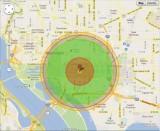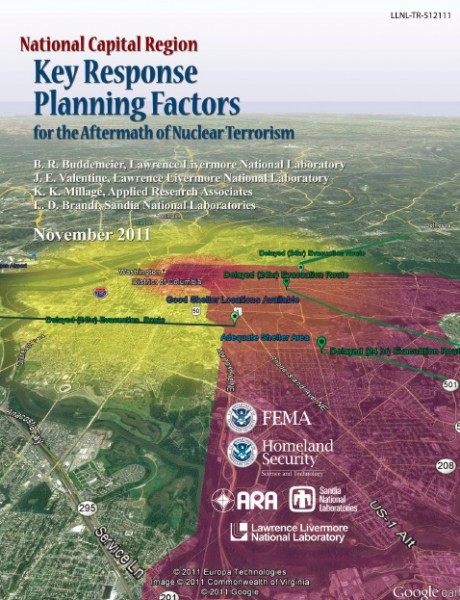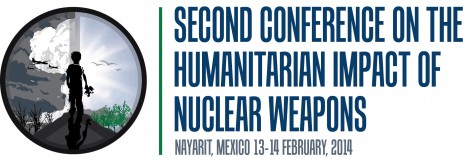PNND raises questions in parliaments: holds 2014 assembly in Washington D.C.
Cover map: The damage radius of a nuclear blast in Washington D.C.
On 20 November 1983 over 100 million Americans sat glued to their TV screens as the horror of nuclear weapons being detonated over their cities and countryside was depicted in the TV movie ‘The Day After’. The issue of nuclear war dominated the news and consciousness not only of the US, but the world.
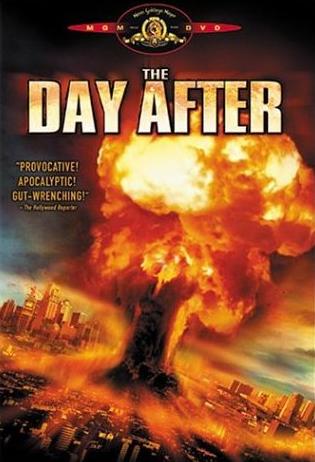
Fast forward 30 years to today, and there is very little public awareness, debate or attention to the arsenals of the Nuclear Weapon States (NWS).
The NWS and media highlight the potential acquisition of nuclear weapons by countries like Iran, and focus a lot of attention on the possibility of a non-State actor (‘terrorist’) acquiring nuclear weapons, but pay little attention to the risk of nuclear conflict amongst the existing NWS by accident, miscalculation or intent.
A U.S. government study in 2011 on the impact of nuclear weapons on Washington D.C., for example, only examined the possibility of the detonation of a bomb by a non-State actor (See 10-kiloton nuclear blast would maim, not destroy, Washington, DC: study).
The forthcoming Nuclear Security Summit in the Hague, will only consider the potential threats of ‘nuclear terrorism’, i.e. the acquisition and use of a nuclear device by a non-State actor (see, Nuke Summit Agenda Circumvents Armed Powers).
This is not only incredibly short-sighted, but also ironic, as the Summit is being held in the same city as the International Court of Justice (the highest court in the world) that in 1996 affirmed that the destructive effects of nuclear weapons use by States 'cannot be contained in time or space', ruled that States are not exempt from international law applicable to nuclear weapons, and that the threat or use of nuclear weapons would generally be illegal. The Court also affirmed that there is an unconditional obligation to negotiate for complete nuclear abolition.
The increased focus on the humanitarian consequences of nuclear weapons by over 125 countries and the forthcoming international conference on this issue in Mexico is thus welcomed. However, the Nuclear Weapon States boycotted the Oslo conference on Humanitarian Consequences of Nuclear Weapons, and look set to do so again for the upcoming Mexico Conference (See Nuclear-Armed Nations to Sit Out Humanitarian Meeting).
PNND (Parliamentarians for Nuclear Non-proliferation and Disarmament) is thus taking the humanitarian consequences debate directly into NWS capitals and legislatures.
PNND Co-President Sue Miller raised questions in the UK House of Lords on UK and humanitarian consequences prior to the Oslo conference and has done so again prior to Mexico (See UK Parliament Hansard, Nuclear War: International Conference).
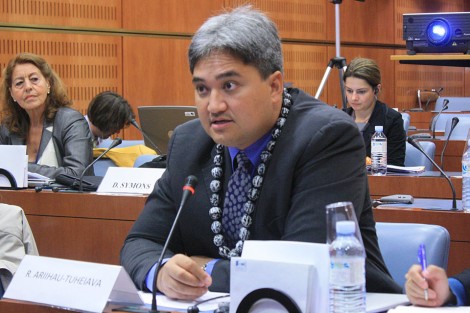
PNND Council Member Senator Richard Tuheiava raising the humanitarian consequences issue in the French Senate
PNND French members raised questions in the French Senate and National Assembly prior to the Oslo conference (see, for example La France absente de la conférence sur l’impact humanitaire des armes nucléaires), and hosted a very successful one-day conference on the topic last month.
And from Feb 25-27, during the first sitting week of the US Congress after the Mexico Conference, PNND will be bringing the humanitarian consequences debate to Washington – with an international parliamentary conference in the Hall of States and an event in the U.S. Senate Kennedy Caucus Room hosted by PNND Co-President Senator Ed Markey and featuring the ATOM Project Honorary Ambassador Karipbek Kuyokov, second generation victim of Soviet nuclear tests.
Please encourage parliamentarians from your country to attend, particularly those who support the abolition of nuclear weapons, and are ready to discuss this with parliamentarians from the United States and other countries.
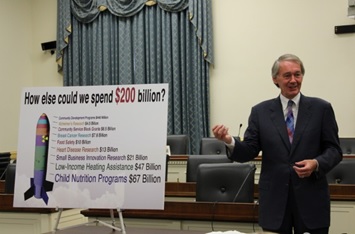
Senator Ed Markey, honorary chair of the PNND Assembly, introducing the SANE Act on cutting nuclear weapons expenditure to fund economic and environemtnal programs
The conference, Climbing the Mountain: Legislators collaborating on bilateral, plurilateral and global measures towards a secure nuclear-weapons-free world, will focus on parliamentary action to fulfil the global obligation to achieve a nuclear weapons free world – an obligation supported by leaders of the NWS including President Obama in his Prague Speech of 2009, but which is not being implemented. Special attention will be given to the humanitarian consequences of nuclear weapons as an imperative to achieve their abolition.
Inspiring speakers including:
- Senator Ed Markey, Member US Senate Foreign Affairs Committee, Co-founder of the US Nuclear Freeze Movement
- State Senator Nan Grogan Orrock (Georgia), President of the US Women Legislators' Lobby
- Karipbek Kuyukov, Second generation victim of Soviet nuclear tests, acclaimed armless painter
- Angela Kane, United Nations High Representative for Disarmament Affairs
- Senator Alena Gajduskova, Vice-President of the Senate of the Czech Republic
- Anita Friedt, US Deputy Assistant Secretary for Arms Control, Verification and Compliance
- Saber Chowdhury MP, President of the Inter Parliamentary Union Standing Commission on Peace and International Security
- Senator Richard Tuheiava, Member of the French Senate Defense Committee, Senator from Polynesia – French nuclear testing region
- US Rep Eleanor Holmes Norton, Author of the US House of Reps Nuclear Disarmament and Economic Conversion Act
- Donald L. Plusquellic, Mayor of Akron, Executive Member Mayors for Peace, Past-President of the US Conference of Mayors
- Paul Dewar MP, Member of the Canada delegation to the NATO Parliamentary Assembly
- Ira Helfand, International Physicians for the Prevention of Nuclear War
- François Stamm, International Committee of the Red Cross (ICRC) – US and Canada Delegation
- Ambassador Richard Burt, U.S. Chair of Global Zero
- Senator Douglas Roche O.C., Canada. Former Ambassador of Disarmament
- Paul Walker, Green Cross International
- William Vendley, Secretary-General, Religions for Peace
For further information contact info@pnnd.org
